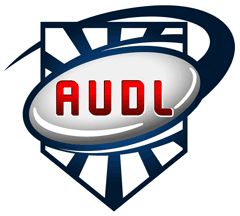July 24, 2012 by Charlie Eisenhood in Opinion with 3 comments
 It has been a tough three weeks for the American Ultimate Disc League. On July 5th, one of the league’s top teams, the Connecticut Constitution, announced on their website that they would be suspending operations due to a lawsuit filed against them by the league. Since that point, a storm of criticism has come down on the league from various team owners and interested observers.
It has been a tough three weeks for the American Ultimate Disc League. On July 5th, one of the league’s top teams, the Connecticut Constitution, announced on their website that they would be suspending operations due to a lawsuit filed against them by the league. Since that point, a storm of criticism has come down on the league from various team owners and interested observers.
The league is in a precarious situation. According to internal emails obtained by Ultiworld, they are concerned about the perception of the AUDL, but they are simultaneously making decisions that continue to hurt that perception. The fact is that there need to be some major changes over the summer to make the league viable moving into its second season. We’ll discuss them below.
ORGANIZATIONAL STRUCTURE
It’s simple: the current organizational model is not sustainable. Yet the issues we’ve seen — arbitrary forfeiting vs. rescheduling decisions, inconsistent fines, and last-minute playoff votes — are just symptoms of the problem. The league’s structure needs to change at its core to give franchise owners the voting power to make decisions for the league, rather than leaving that in the hands of Josh Moore, the AUDL President.
John Korber, the General Manager of the Connecticut Constitution, put it well in the very first article Ultiworld published about the dispute. The league’s incentive, he said, is to sell more franchises and not to deal with “policies that increase the value of the current teams.” But the owners obviously want to increase the value of their team. “The realities of those incentives have created a completely disjointed operation.”
The league is already facing a glaring problem since its Vice President of Marketing also owns a team (the Detroit Mechanix) and purchased the Boston franchise after an allegedly unethical vote. How can a team owner coexist as a league executive when their interests are not the same?
The only way to remedy this is to align everyone’s incentives with a more traditional sports league structure, in which the franchise owners collectively own the league and vote to elect a Commissioner or President who is tasked solely with operating the league. This would fix a lot of problems: revenue sharing, rule enforcement, marketing, etc. Issues that arise would be voted on collectively and arbitrated by an elected leader whose incentives are to follow the majority will of the franchise owners.
Could this change slow the expansion of the league? Yes, if the current teams felt that made sense. But the current expansion plan seems far too aggressive to be sustainable. It’s hard to imagine the league running with 48 teams in just two years. This is what you would expect, however, when the league front office earns money largely through the sale of new franchises. The new structure would create a new position for someone to sell franchises (not the President or Commissioner).
COMMUNICATION
Perhaps the league’s largest failure this season has been open and honest communication with the teams, the Ultimate community, and the media. Owners have consistently complained about a lack of discussion between themselves and the league on various issues. Regardless of your view on the Connecticut/Rhode Island legal dispute, it is bizarre that the league did not inform the owners of new franchises in Boston and New York for months after selling them.
Additionally, Moore quietly worked out a deal with the Philadelphia franchise to compensate them for new franchises in New Jersey and New York, while negotiations broke down with Connecticut, leading to the current lawsuit.
Moore’s actions since that point seem to be increasingly vindictive towards Connecticut. The league issued them a $20,000 fine, barred them from returning to action, and cut them out of email communications. This is not the way to resolve a legal dispute, particularly a very public one. The moves seem more geared towards making it increasingly difficult for Connecticut’s ownership to continue operating their team, which could help pave an easier path to New York and Boston franchises.
Despite frequent attempts, Ultiworld has not spoken with the league since July 10th.
ENDGAME
The outcome of the lawsuit is not particularly important to the ability of the league to move forward in a strong position next season. The fact is that many owners are unhappy with the current state of the league (including Philadelphia’s Jeff Snader and Indianapolis’ Thom Held — who run the league’s two most successful franchises). There will need to be major changes. There have been some suggestions — both from team insiders and outside observers — that the current teams could just jump ship and start a new league operating independently from the AUDL.
That is not out of the question, but it is an obviously suboptimal solution. The AUDL can be fixed and, judging by the amount of money being poured into this legal battle, can be successful. That will require some hard choices by Josh Moore. He has proven to be right that spectator Ultimate is possible but he needs to recognize the dysfunction currently hurting the league. Even in a world where Connecticut and Rhode Island fold and new teams open in Boston and New York, these problems don’t disappear.